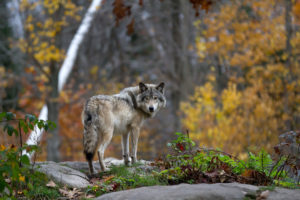
Many holiday observances such as Christmas or Hanukkah have been passed down through centuries. Meanwhile, newer celebrations like Kwanzaa or Juneteenth have been created to commemorate special events or speak to important values. Newly created in 2018, Wolfenoot has a mythic feel and themes that resonate with both adults and children alike. While this holiday is only a few months old, it’s already leaving an impact on people all over the globe.
A Child’s Unique Invention
Freelance journalist Melissa Locker recounted the history of Wolfenoot in an October 2018 Time article. In September, New Zealand author Jax Goss announced on her social media pages that her seven-year-old son had thought of the new holiday. Goss speculated that the boy conceived of Wolfenoot because he is an animal lover and had been exposed to conservation concepts through her work at a local zoo.
To Goss’s surprise and elation, the idea of Wolfenoot quickly went viral. She later returned to social media and asked that posts related to the holiday be shared under the #Wolfenoot hashtag. She also registered and created a Wolfenoot website called No Hate Only Snootboops, along with Facebook pages where people can discuss and share their observances with others.
Although Wolfenoot’s November 23 date placed it very close to Thanksgiving this year, Goss clarifies that her son did not schedule it that way on purpose. Wolfenoot’s proximity to the 2018 American holiday occurred by happenstance, but it was also particularly fortuitous because the full moon occurred on the same date. However, its observance will land on the Saturday before Thanksgiving in 2019 and on the Monday prior in 2020.
What Does the Holiday Commemorate?
According to Goss, her son explained that Wolfenoot occurs “when the Spirit of the Wolf brings and hides small gifts around the house for everyone.” The boy selected November 23 for its observance, claiming its significance as “the anniversary of the Great Wolf’s death.” Those who’ve shared their lives with dogs or shown them kindness are favored by the Spirit of the Wolf, who rewards their deeds with the choicest of gifts.
How To Celebrate Wolfenoot
When Goss spoke of Wolfenoot, she related her son’s idea that individuals can mark the holiday in whatever fashion they desire. At the same time, he’s also offered several suggestions for those wishing to observe. Roasted meat is key in celebrations, considering that canine species consume meat as part of their diets. He also recommends serving a cake that’s decorated like a full moon. Fortunately, vegetarians can also celebrate by eating their preferred foods in honor of the Great Wolf.
At the same time, people have used the holiday to highlight charities dedicated to animal preservation and care. Many opted to raise funds for dog shelters and wolf sanctuaries. Even some of these organizations, along with other nonprofits and merchants, got in on the act to share content and promote their groups on social media.
Unsurprisingly, some pagans are also embracing the holiday. In a November 2018 blog post, Patheos blogger John Beckett described Wolfenoot as “not pagan but organic,” adding that it touches on spiritual and natural aspects that Neopagans already welcome. Even so, he stressed to readers that the holiday’s creator intended for it to be observed by anyone regardless of creed or background.
Creating Meaning in the 21st Century
Thanks to the human need to celebrate and remember vital events, people have created a wide range of holidays. Since dogs and humans have shared a symbiotic relationship and wolves take on symbolic meanings in many civilizations, it’s not unusual that a holiday now exists to honor them. Amid critiques of Thanksgiving’s association with cruelty toward Native peoples and Christmas becoming commercialized, Wolfenoot may hold a new place in the hearts of celebrants worldwide.

